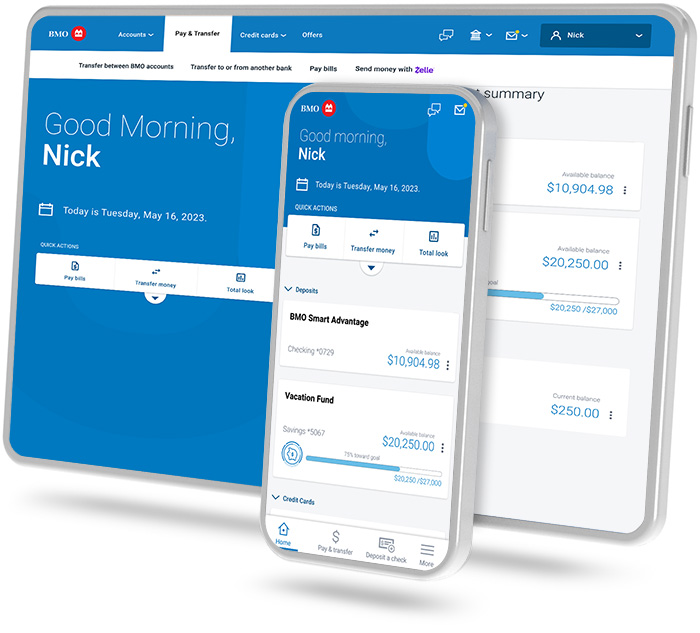BMO Personal Banking
What can we help you find today?
Special Offers
From everyday banking to credit cards, find ways to save money and make real financial progress.
New Financial Progress Hub
Access our financial resource hub to help you manage your money and plan for your future.
Explore our checking accounts
We have a checking account to help you achieve your financial goals.
Security alerts: Learn what to look for
Identify and learn how you can protect yourself against the different types of fraud.
Let's talk spending in relationships
Couples are more likely to argue about spending habits. Explore how couples communicate about finances.
BMO Smart Advantage Checking
Make your money go farther with our most popular checking account.
Explore our checking accounts
We have a checking account to help you achieve your financial goals.
Switch to BMO in 3 easy steps
We’ve prepared a switch kit to make switching banks even easier for you.
Should I open a CD or money market account?
Both are steady methods to help you grow your money.
How to start an emergency fund
Life can be unpredictable – it’s important to build your savings for those “just-in-case" moments.
Money market offer bundle
Earn an even higher interest rate by bundling a money market with a Relationship Checking Account.
BMO Cash Back Credit Card
Earn cash back on your everyday purchases such as groceries, gas and TV streaming services.
Explore our credit cards
We have a credit card to bring you the best perks and match your lifestyle.
How does a balance transfer work?
Understand the pros and cons of submitting a balance transfer.
Need to activate your credit card?
Learn how to activate your card and manage it on the go.
Your rewards. Your way.
Visit bmoflexrewards.com to explore your redemption options.
Get a low rate on a HELOC
Make the most of the equity in your home with a home equity line of credit (HELOC).
Explore our loan options
Whether you need to purchase a new car, buy a home, or cover a large expense, we can help you get there.
Loan calculators
Answer all of your lending questions with the help of our calculators.
Everything you need to know about fixed vs. adjustable rate mortgages
Find out what the difference is and which one is right for you.
HELOC or HELOAN?
Find out whether a home equity line of credit (HELOC) or home equity loan (HELOAN) is right for you.
Mortgage special offers
Learn how you can save on mortgage costs with our special limited-time offers.
Invest with BMO
Whether you need help with financial planning or you’re saving for retirement, we’re here to help.
Investment calculators
Use our handy calculators to help plan for an investment or for your retirement.
BMO Digital Banking
Enjoy features like BMO Total Look to track and manage your finances and Zelle®, an easy way to send and request money.
Financial Progress Hub
Access our financial resource hub to help you manage your money and plan for your future.
10 financial goals to set for yourself
Thinking about how you can rock your goals? Don’t forget your financial ones too!
Should I open a CD or money market account?
Both are steady methods to help you grow your money.
What's a HELOC?
A home equity line of credit (HELOC) can help you access funds for major purchases such as a home renovation.
What is a credit score?
Get a better understanding of the factors influencing your score and helpful tips to improve your rating.
Bank anywhere with BMO Digital Banking
Bank on-the-go anywhere, anytime with our app. Enjoy 20+ features that help you make real financial progress.

Need support? That’s what we’re here for
BMO online support
Get the support you need using our tool
Visit us
Find the nearest BMO branch to you
